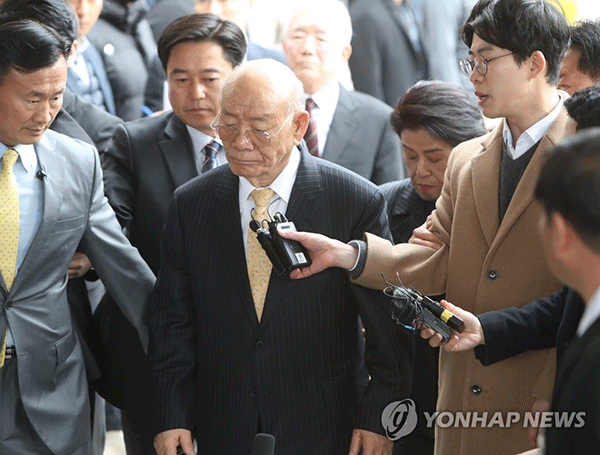Former President Chun Doo-hwan on Monday denied the prosecution's claims that in his memoirs he defamed a deceased priest over his eyewitness account of the brutal crackdown on a 1980 pro-democracy uprising under Chun's rule.
In a trial being held in the southwestern city of Gwangju, the 88-year-old stressed that the memoirs were written based on historical records and the prosecution's initial investigation reports and that he had no reason to deliberately harm the reputation of Cho Chul-hyun, the activist priest who gave the testimony.

"There is insufficient evidence to back up Cho's claims about strafing ... The charges must be dropped unless the prosecution can prove the firing indeed happened and that it happened at that exact time (as claimed by Cho)," Chung Joo-kyo, Chun's lawyer, said.
Chun, who ruled the country from 1980-1988, was indicted in May last year for describing Cho as "Satan wearing a mask" in his book published in early 2017.
Cho was among the key witnesses in the Chun government's bloody crackdown on the Gwangju revolt. He testified that he saw the military firing at citizens from helicopters during the suppression of the protests against Chun's rule.
The stiff-faced Chun sat in the courtroom with his wife and former first lady Lee Soon-ja.
At one point at the beginning of the hearing, he wore his headset and asked the judge to repeat what he had said.
The hearing lasted one hour and 16 minutes. The court scheduled the next hearing for April 8.
Monday's court appearance by the disgraced ex-leader comes more than two decades after he stood in a criminal trial on treason and other charges in 1996.
The former Army general, who seized power in a 1979 coup, received the death penalty, but the top court reduced the sentence to life imprisonment. He was released in December 1997 on a presidential pardon.
Prosecutors began an investigation on libel allegations after Cho Young-dae, Cho's nephew, filed a complaint. If convicted, Chun could face up to two years in prison or up to 5 million won (US$4,400) in fines.
The Gwangju District Court has issued a subpoena against Chun after he repeatedly refused to come to the hearing, citing health conditions that include a claim he suffers from Alzheimer's disease.
His lawyer has said the former president has no intention of evading the court proceedings.
When asked by a reporter at the Gwangju court earlier if he still denies he ordered the firing, Chun, clad in a dark suit and a yellow tie, said, "What do you think you're doing?"
On May 18, 1980, the brutal crackdown on student-led demonstrations against Chun's junta sparked a massive civilian protest in Gwangju. When the troops fired into crowds, it is said protesters began to arm themselves. According to an official tally, the bloodshed led to the deaths of around 200 people and 1,000 injured.
Ahead of Monday's court hearing, Cho Young-dae, also a Catholic priest, called for the former president to admit to his wrongdoing "at least for once."
"He must say something, that he admits his guilt," he told reporters. "I hope this historic moment will be the beginning of finding the truth. ... And this is the chance (for Chun) to repent for his sin. I pray he doesn't stir the ire of Gwangju citizens by telling lies."
How to define the Gwangju uprising remains a deeply divided issue in South Korea and is often a subject of ideological confrontation between conservatives and liberals.
Last month, the main opposition Liberty Korea Party expelled one of its lawmakers for making disparaging remarks about the Gwangju incident as being a riot that had involved North Korean troops.
A series of truth-finding probes have been conducted regarding the Gwangju uprising, with the latest announced in October last year that found there were at least 17 suspected cases of sexual violence committed by soldiers on dozens of women.
Chun has never admitted responsibility or apologized for the revolt. (Yonhap)

